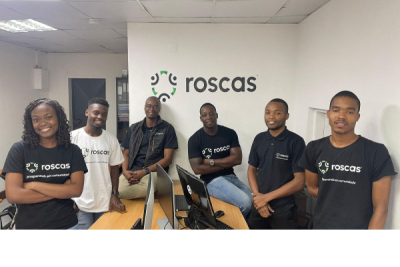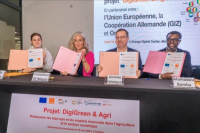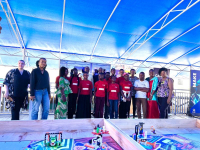Strive Masiyiwa dreams of a future where every African, without exception, is digitally connected. His impact on the continent has been widely recognized and honored.
Strive Masiyiwa (photo), a philanthropist and businessman from Zimbabwe, is the founder and executive chairman of Cassava Technologies. His use of technology has significantly improved the lives of individuals and businesses across Africa, creating a wealth of opportunities and stimulating economic growth.
Established in 2021, Cassava Technologies has emerged as a pillar of digital transformation in Africa. Headquartered in London and operating in 31 countries, the company provides a wide array of products and services in as many as 94 countries. Its portfolio includes subsidiaries such as Liquid Network, Liquid Dataport, Liquid C2, Africa Data Centres, Distributed Power Africa, Sasai Fintech, Telrad, and Vaya Technologies.
Cassava Technologies is a part of the Econet Group, which also encompasses Econet Wireless. The latter is a telecommunications service provider in sub-Saharan Africa, offering services like mobile and fixed wireless telephony, public telephones, internet access, and payment solutions. It launched its inaugural mobile network in 1998.
In addition to his business ventures, Masiyiwa is deeply committed to social causes through the Higherlife Foundation, which he co-founded with his wife, Tsitsi. The foundation has supported the education of 250,000 orphaned children across Africa and has also sponsored health programs, disaster relief, and rural development initiatives.
Masiyiwa has been a non-executive director of Netflix since 2020 and also serves on the board of the Bill & Melinda Gates Foundation and National Geographic, a premier media outlet in science and exploration. He is a member of the global advisory board for Bank of America.
From 2003 to 2018, Masiyiwa was a board member of the Rockefeller Foundation and served as a non-executive director for the consumer goods company Unilever from 2016 to 2024. He was an African Union special envoy for combating Covid-19 from 2020 to 2022.
Masiyiwa’s significant impact on the tech scene, both in Africa and globally, has earned him numerous accolades. In January 1990, he was honored as the Zimbabwean Businessman of the Year. In January 2020, Bloomberg named him among the 50 Most Influential People in the World, and Mail & Guardian listed him among the 100 Most Influential Africans. That same year, JA Worldwide inducted him into the Junior Achievement Worldwide Global Business Hall of Fame. In 2021, Fortune Magazine ranked him among the 50 Greatest World Leaders.
Melchior Koba
Kenyan agritech company SunCulture recently announced the successful completion of a $12 million funding round. The funds will be used to introduce solar irrigation systems, leveraging the Internet of Things technology, to numerous smallholder farmers by 2030.
On Monday, April 15, Roscas, a fintech startup based in Mozambique, announced the successful closure of a funding round. The financial details of the operation, spearheaded by Renew Capital—an American investment firm with a focus on Africa—remain undisclosed. The newly acquired funds will help the company further develop its technology. Specifically, it aims to provide access to social protection products such as insurance, capitalized savings, and loans for individuals who have historically been marginalized from formal financial systems.
The ongoing digital transformation across the continent has already revolutionized everyday practices and instigated profound societal changes. Notably, the education sector, which holds significant importance, is also experiencing substantial reforms.
On April 15, in Algiers, Kamel Baddari, the Algerian Minister of Higher Education and Scientific Research, unveiled plans for a new digital platform. This platform, designed to guide recent high school graduates, will leverage artificial intelligence to help students choose their future educational paths based on their academic records.
Baddari explained, “Graduates from the June 2024 session will have access to a digital platform designed to identify the fields and specialties that best align with their abilities and grades. This will be achieved using artificial intelligence techniques and data analysis.”
The new platform is part of a broader series of digital reforms recently initiated by the Ministry of Higher Education. These reforms have led to significant savings for the ministry, approximately 72 billion DA (around $53.4 million) in university catering costs and 640 million DA in university transportation from October to last March. The digitization process has thus allowed the ministry to streamline expenses and enhance service quality.
The Algerian government’s investment in this new guidance platform aims to reduce dropout rates, reorientation needs, and student dissatisfaction. The artificial intelligence incorporated into the platform will aid young people in making informed decisions about their university courses. The ultimate goal is to transform student life through precise post-baccalaureate guidance and the selection of a professional, customized curriculum. This will enable students to contribute to wealth creation and job opportunities, thereby adding value to the national economy.
Samira Njoya
On Friday, April 12, the Information and Digital Systems Agency (ASIN) of Benin initiated a call for applications for a Women’s Bootcamp focused on cybersecurity. The initiative aims to equip 22 young women, aged between 18 and 25, with an in-depth knowledge of prevalent web application vulnerabilities and the methods to ethically identify and exploit them. Applications are open until April 24, with the training scheduled from April 29 to May 3, 2024.
As an entrepreneur, he aims to ensure that sensitive products such as vaccines are transported under the right conditions, from the pharmacy to the patient.
Christian Cédric Toe (photo), an engineer and entrepreneur from Burkina Faso, is the founder of Laafi Concepts. His company provides an all-encompassing solution for tracking the critical conditions of sensitive items such as vaccines and other pharmaceuticals throughout their supply and distribution chain.
Established in 2020, the startup aims to enhance the availability of health products, including vaccines, and bolster food safety across the continent. Central to its services is the Laafi Monitor, a device that enables customers to track the temperature, humidity, and light exposure of their products in real-time. With its customizable alert features, this tool offers reassurance by alerting users to any critical changes.
In addition to this, the startup has created Laafi Mobile, an app designed to monitor and manage the transport and storage conditions of sensitive products, thereby providing a comprehensive solution to its clients.
Laafi Concepts has benefited greatly from the strategic support of Orange. Christian Cédric Toe acknowledges, “Orange has been instrumental in helping us identify new markets, providing mentorship, and granting us access to its network of experts. This support has been pivotal in the development and marketing of our product.”
Laafi Concepts has set ambitious development goals. The entrepreneur shared with We Are Tech Africa, “We aim to standardize all our processes, enhance the accessibility of our products, increase our institutional customer base to 100 by 2025, develop new features for our solution, and expand our presence in new markets in Sub-Saharan Africa.”
Toe was invited to the World Electronics Forum in Morocco, which ran from Monday, April 15, to Thursday, April 18. This event provided him with the opportunity to network and collaborate with other business leaders.
Toe is an alumnus of the Polytechnic University of Bobo-Dioulasso, where he earned a bachelor’s degree in industrial engineering and maintenance in 2013. Prior to founding Laafi Concepts, he introduced Laafi Bag, a refrigerating bag that can keep vaccines at the correct temperature for 90 hours. This innovative product, developed by his company Genuine Concept (2015-2020), won him the innovation award at the Rebranding Africa Awards in 2016.
Melchior Koba
Digital technologies are significantly revolutionizing agriculture, impacting every stage of the value chain from production to marketing. Therefore, it's crucial to focus on improving funding to facilitate this transformation.
Orange, in partnership with the European Union and the German Cooperation (GIZ), recently announced the launch of "DigiGreen & Agri," an ambitious project aimed at enhancing the use of digital technology in the cocoa sector in Côte d'Ivoire.
This ambitious partnership benefits from joint funding of 7.6 million euros and will be implemented over three years, with the main objective of creating jobs for youth in digital agriculture or e-agriculture. The focus is particularly on young people from rural areas, women, girls, and individuals with disabilities, through the Orange Digital Center in Côte d'Ivoire.
Jérôme Hénique, CEO of Orange Africa and Middle East, explains: “The Orange Digital Centers serve as crucial catalysts for this transformation, providing a free and open innovation ecosystem accessible to all, with a special focus on youth, women, and vulnerable individuals. Collectively, we are rising to the challenge of constructing an inclusive digital future that respects the environment, paving the way for a more sustainable and prosperous economy.”
The DigiGreen & Agri project is part of the efforts and the desire of the European Union to strengthen smart, clean, and secure links in the digital sector, one of the pillars of the Global Gateway Strategy. This strategy aims to mobilize up to 300 billion euros to develop international cooperation in the fields of digital technology, energy, and transportation.
In Côte d'Ivoire, the implementation of the new project should contribute to the improvement of professional skills, the promotion of entrepreneurship, and the modernization and innovation of sustainable agriculture sectors, low-carbon transition, and corporate social responsibility. The project will also contribute to the evolution of the cocoa sector, which accounts for 22% of the GDP and employs 50% of the active workforce, but receives only 5% of bank financing.
Samira Njoya
The solution, launched by a Franco-Beninese tech entrepreneur, aims to improve pregnancy management across Africa.
Mama Care, an e-health solution developed by the Franco-Ivorian startup Susu, offers pregnant women comprehensive medical support and practical advice throughout their pregnancy and the initial months of their baby’s life. The startup, headquartered in Lyon, France, and with regional offices in Abidjan (Côte d’Ivoire), Dakar (Senegal), and Douala (Cameroon), was established in 2019 by Franco-Beninese entrepreneur Bola Bardet.
To enhance its technology, broaden its services, and facilitate its continental expansion, Susu has completed several funding rounds. In March 2022, it raised $1 million, followed by an additional $4.5 million in December 2023. Commenting on this recent fundraising, Bardet stated, “Our mission is to democratize healthcare access across the entire African continent by offering innovative solutions for quality care and financing our beneficiaries’ health. […] This funding will enable us to continue our development and fulfill our ambition of transforming the daily lives of millions of Africans.”
Launched in July 2022, the Mama Care app is available on iOS and Android and has already been downloaded over 50,000 times on PlayStore. After installing the app, pregnant women need to create an account to access Mama Care’s various services. These services include ultrasounds, blood tests, consultations, comprehensive assessments, and home visits from midwives, along with personalized advice and information on nutrition and lifestyle.
“Mama Care covers all prenatal and postnatal consultations for the expectant mother, as well as her delivery, in collaboration with the top clinics and hospitals in Côte d’Ivoire,” the startup explains.
The platform offers three packages for its services. “Mama Light” starts at XOF5,000 (about $8) per month, “Mama Zen” at XOF20,000 per month, and “Mama Plus” at XOF60,000 per month. While the platform is available in Côte d’Ivoire, Senegal, and Cameroon, some services are not yet available in the latter two countries.
Adoni Conrad Quenum
The Future World team emerged as the champions of the inaugural First Lego League, which took place on Saturday, April 13, at Sèmè City Open Park in Cotonou, Benin. The competition, a collaborative effort between Sèmè City and STEM Inspires, was themed “Quand l'art et la technologie se rencontrent (When Art and Technology Meet).”
The event offered a platform for young individuals aged 9 to 16, divided into various teams, to explore and apply concepts from science, technology, engineering, and mathematics (STEM) through an engaging and educational robotics program. In addition to winning the best team award, Future World also took home the prize for the best team with the most innovative project. The "Design du Robot," "Match de Robot," and "Valeurs fondamentales" awards were won by the Tech BoT Warriors, Dixitbot Squad, and Agodjié, respectively.
AfriLabs, in collaboration with Intel Corporation and Prosper Africa, recently announced the launch of the Intel Community Reach program. The initiative aims to support tech players who leverage artificial intelligence or high-speed connectivity to catalyze social change in Africa. Interested organizations, companies, startups, SMEs, and institutions can submit their applications before June 7.
More...
A biomedical engineer by training, he ventured into healthcare entrepreneurship, successfully launching five startups, including Aumet, which is expanding across the Middle East and North Africa.
Yahya Aqel (photo), founder and CEO of Aumet, leads a business-to-business marketplace for pharmaceutical products in the Middle East and North Africa (MENA) region. Based in the United States, the startup operates in Jordan, Saudi Arabia, Egypt, and Oman.
Established in 2020, Aumet provides a platform that connects pharmaceutical suppliers with pharmacies, streamlining the supply process and enhancing access to medical supplies. The company was founded to make the acquisition of medical supplies by healthcare providers more efficient and transparent. One of the features distinguishing its platform is artificial intelligence. By harnessing data analytics, the platform optimizes inventory restocking, anticipates needs, and connects healthcare providers with the most suitable suppliers.
Since its inception, the startup has enjoyed the support of Orange as a development partner. It has benefited from guidance and expertise in various areas, including technological development, marketing, and commercial expansion. Currently, the company is represented at the World Electronics Forum, which is ongoing in Morocco until Thursday, April 18, 2024.
When asked about expansion plans, Yahya Aqel reveals ambitious aspirations. "We have ambitious expansion prospects in new markets, both regional—like the GCC (UAE, Kuwait, Qatar, and Bahrain), Morocco, and Iraq—and international, including France, the UK, and the US. We see significant growth opportunities in markets where healthcare supply processes are inefficient or fragmented," he told We Are Tech Africa.
Yahya Aqel graduated from Hashemite University in Jordan in 2006 with a bachelor’s in biomedical engineering. He also holds an MBA from IE Business School in Madrid, Spain, earned in 2015. Before embarking on the Aumet venture, he founded four other startups. It all began with Al-Sumow International Co., a medical manufacturer established in Kuwait in 2005, where he served as managing director until its acquisition in 2011.
In 2011, he co-founded Aqel Universal Medical Equipment and Tools, a company specializing in the manufacture of health products, including disposable non-woven and plastic items, in the Gulf region. He led this company as CEO until 2014, when he launched Healthy Brain, an e-commerce platform dedicated to selling medical products.
In 2016, he continued his entrepreneurial streak by co-founding OnEx, a sales platform for health product manufacturers and distributors. This platform enabled users to expand their operations both internationally and locally.
Recognized for his significant impact on the healthcare sector, Yahya Aqel was honored as Entrepreneur of the Year by EY in 2019. His startup has also been recognized by the World Economic Forum as one of the top 100 globally, demonstrating its growing global influence.
Melchior Koba
The upgrade of forensic laboratories in Africa enhances law enforcement's ability to effectively investigate crimes, gather crucial evidence, and ensure justice and security across the continent.
Mozambique has unveiled a digital forensic laboratory to bolster the country’s ability to gather crucial evidence for criminal investigations and legal proceedings. This initiative, supported by China, was announced last Thursday April 11 at an inauguration ceremony.
“The new laboratory will enhance Mozambique's capacity to produce evidence crucial for criminal investigations and legal proceedings,” said Interior Minister Pascoal Ronda.
The upgraded laboratory, part of the National Criminal Investigation Service (SERNIC)’s modernization efforts, equips law enforcement with specialized tools to combat technologically facilitated crimes, reinforcing Mozambique's evidence-gathering capacity and enhancing public security.
In a timely development, Mozambique establishes a laboratory to address a range of crimes, with human trafficking being a major concern, as highlighted in the Africa Organized Crime Index Report 2023.
The new laboratory will help in addressing various complex crimes, while contributing to bilateral cooperation and peace promotion between Mozambique and China.
Hikmatu Bilali
Digital transformation is at the core of the Burkinabe government's development programs. Ouagadougou is seeking the World Bank's assistance to meet the objectives of its digital strategy in the coming years.
Burkina Faso is seeking parliamentary approval for a $150 million loan from the International Development Association (IDA) to fund the Digital Transformation Acceleration Project (PACTDIGITAL). The cabinet, meeting on Thursday, April 11 in Ouagadougou, authorized this bill's submission to the Transitional Legislative Assembly for ratification.
PACTDIGITAL aims to enhance access to infrastructure, public services, and digital skills in Burkina Faso. It follows the recently concluded West African Regional Communications Infrastructure Project (PRICAO-BF) and the e-Burkina project. It will build on their achievements to develop a foundation for further digital initiatives.
The funding provided by the IDA, a World Bank institution, will be used to expand broadband access in underserved and poorly served areas, improve the availability and accessibility of digital public services, and enhance the digital skills of project beneficiaries (new digital public services in targeted sectors such as education, health, employment, etc.).
The primary beneficiaries include women, youth, people with disabilities, displaced persons, host communities, public employees (civil servants, teachers, and trainers), private businesses, formal and informal training institutes, local incubators, and associations.
The decisions made during the cabinet meeting underscore the transitional government's commitment to steering Burkina Faso toward sustainable and inclusive development.
Samira Njoya
As space technologies become increasingly vital for sustainable development in Africa, more countries are strengthening their space programs to leverage the benefits of space technologies in their national goals.
TRL Space Rwanda, a branch of a Czech-based space company, in collaboration with the Rwanda Space Agency (RSA) announces plans to invest in strengthening local capabilities for nanosatellite technology development, focusing on constellations orbiting near the equator. The TRL's ambition was announced during Czech President Petr Pavel’s visit to Rwanda for the 30th commemoration of the 1994 Genocide Against the Tutsi on April 6.
The investment and satellite mission have already begun, with the first phase dedicated to the agriculture sector in Rwanda. “Our intention is not just to deliver these technologies to Rwanda. We bring added value to the region. Our goal is to introduce new space technologies that increase the economic and living standards of the entire region,” TRL Space CEO, Petr Kapoun, revealed.
According to Space in Africa's annual report on African space activities, Space exploration is closely tied to the United Nations' 17 Sustainable Development Goals and the African Union's Agenda 2063. As African nations increase their engagement in space activities, they prioritize applications like Earth observation and initiatives for digital accessibility, crucial for sustainable progress.
The initiative aims to introduce new space technologies to increase the economic and living standards of the region. TRL Space Rwanda seeks to collaborate with the government, universities, and research organizations to explore space depths and leverage satellite data for various sectors such as agriculture, mining, and disaster management, aligning with Rwanda's ambition to create a vibrant space ecosystem for socio-economic development.
Hikmatu Bilali















